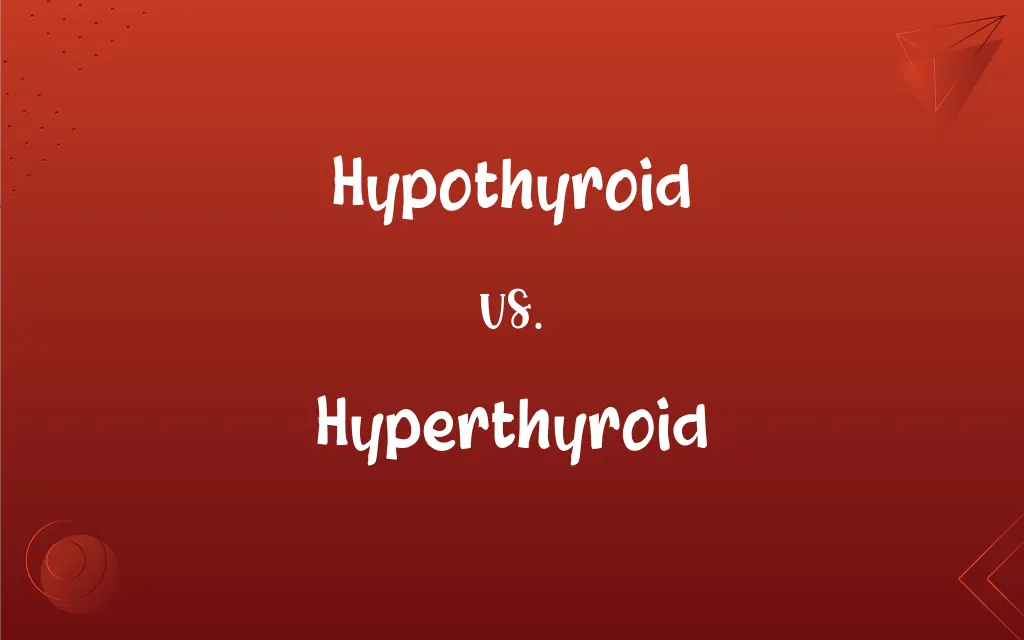Hypothyroid vs. Hyperthyroid: What's the Difference?
Edited by Aimie Carlson || By Harlon Moss || Updated on October 26, 2023
Hypothyroidism refers to an underactive thyroid gland, while hyperthyroidism denotes an overactive one.

Key Differences
Hypothyroid and hyperthyroid conditions stem from the thyroid gland's altered activity. Hypothyroidism occurs when the thyroid gland doesn't produce enough thyroid hormones. Conversely, hyperthyroidism is the result of an overproduction of these hormones.
Hypothyroidism, being an underactivity, typically leads to a slowing down of metabolic processes. Symptoms might include fatigue, weight gain, and cold sensitivity. Hyperthyroidism, on the other hand, accelerates the body's functions. This might cause rapid heartbeat, weight loss, and increased sensitivity to heat.
It's important to note that the thyroid gland plays a pivotal role in regulating metabolism. When hypothyroid conditions set in, the body's metabolism tends to decrease. In contrast, hyperthyroid conditions ramp up metabolic activities, causing increased energy consumption.
Various factors can contribute to both hypothyroid and hyperthyroid conditions. Autoimmune diseases, certain medications, and thyroid surgery can trigger hypothyroidism. Meanwhile, Graves' disease, thyroid nodules, and excess iodine can lead to hyperthyroidism.
In medical practice, both hypothyroid and hyperthyroid disorders are diagnosed through blood tests measuring thyroid hormone levels. Treatment for hypothyroidism often involves thyroid hormone replacement, while hyperthyroidism may require medication, radioactive iodine, or surgery.
ADVERTISEMENT
Comparison Chart
Hormone Production
Decreased
Increased
Metabolic Rate
Slowed
Accelerated
Common Symptoms
Fatigue, weight gain, cold sensitivity
Rapid heartbeat, weight loss, heat sensitivity
Treatment
Thyroid hormone replacement
Medication, radioactive iodine, surgery
Causes
Autoimmune diseases, medications, thyroid surgery
Graves' disease, thyroid nodules, excess iodine
ADVERTISEMENT
Hypothyroid and Hyperthyroid Definitions
Hypothyroid
An underactive thyroid gland's state.
His weight gain was attributed to a hypothyroid condition.
Hyperthyroid
Excessive functionality of the thyroid gland.
Hyperthyroid patients often feel warmer and more restless.
Hypothyroid
A deficit in thyroid gland functionality.
Hypothyroid patients often feel colder than others.
Hyperthyroid
A condition where the thyroid overproduces hormones.
She had a rapid heartbeat due to her hyperthyroid condition.
Hypothyroid
A condition of decreased thyroid hormone production.
She was diagnosed with hypothyroid after experiencing constant fatigue.
Hyperthyroid
An overactive state of the thyroid gland.
His weight loss was a result of hyperthyroidism.
Hypothyroid
Reduced secretion of hormones from the thyroid gland.
Blood tests confirmed her hypothyroid status.
Hyperthyroid
A metabolic acceleration due to high thyroid hormone levels.
Feeling constantly anxious can be a sign of hyperthyroidism.
Hypothyroid
A metabolic slowdown due to low thyroid hormone levels.
Feeling lethargic can be a symptom of hypothyroidism.
Hyperthyroid
Enhanced secretion of hormones from the thyroid gland.
His hyperthyroid condition was confirmed through blood tests.
Hypothyroid
Of, relating to, or affected with hypothyroidism.
Hyperthyroid
Of, relating to, or affected with hyperthyroidism.
Hypothyroid
Of or pertaining to hypothyroidism
Hyperthyroid
Of or pertaining to hyperthyroidism
Hypothyroid
Having hypothyroidism
Carl Lewis is hypothyroid.
FAQs
What causes hypothyroid conditions?
Causes can include autoimmune diseases, certain medications, and thyroid surgery.
How is hyperthyroidism typically treated?
Treatment options include medication, radioactive iodine, and surgery.
Are there specific tests to diagnose these conditions?
Yes, blood tests measuring thyroid hormone levels are used to diagnose both.
Which condition results in weight gain, hypothyroid or hyperthyroid?
Hypothyroidism often leads to weight gain, while hyperthyroidism can result in weight loss.
What are the dietary recommendations for hyperthyroid patients?
Patients might be advised to avoid excessive iodine and consume a balanced diet.
How often should hyperthyroid patients get checked?
Regular follow-ups are essential, but the frequency depends on the individual's condition and treatment.
Can children get hyperthyroidism?
Yes, children can develop hyperthyroid conditions, though less commonly than adults.
Can hypothyroid and hyperthyroid conditions be hereditary?
Both conditions can have a genetic component and run in families.
What complications can arise from untreated hypothyroidism?
Complications might include heart problems, mental health issues, and myxedema coma.
What are hypothyroid and hyperthyroid conditions?
Hypothyroid refers to an underactive thyroid gland, while hyperthyroid indicates an overactive one.
Is there a link between hypothyroidism and cholesterol levels?
Yes, untreated hypothyroidism can raise cholesterol levels.
Are there natural remedies for hyperthyroid conditions?
Some claim benefits from natural treatments, but it's crucial to discuss with a healthcare provider first.
How does iodine relate to hypothyroid and hyperthyroid conditions?
Iodine is essential for thyroid hormone production. Deficiency can lead to hypothyroidism, while excess can trigger hyperthyroidism.
How does hyperthyroidism affect the heart?
Hyperthyroidism can cause rapid heartbeat or arrhythmias.
Are there specific foods hypothyroid patients should avoid?
Some suggest avoiding excessive soy and certain raw vegetables, but dietary choices should be discussed with a healthcare provider.
Can hyperthyroidism return after treatment?
It's possible, especially if the underlying cause isn't addressed, necessitating regular monitoring.
How quickly can treatment alleviate hypothyroid symptoms?
It varies, but some patients feel better within weeks of starting thyroid hormone replacement.
Can pregnancy affect hypothyroid conditions?
Pregnancy can impact thyroid function, and hypothyroid pregnant women might need adjusted medication.
Can hypothyroidism cause depression?
Yes, depression is a potential symptom of hypothyroidism.
Is exercise recommended for hyperthyroid patients?
Exercise can be beneficial, but patients should consult their doctor for personalized recommendations.
About Author
Written by
Harlon MossHarlon is a seasoned quality moderator and accomplished content writer for Difference Wiki. An alumnus of the prestigious University of California, he earned his degree in Computer Science. Leveraging his academic background, Harlon brings a meticulous and informed perspective to his work, ensuring content accuracy and excellence.
Edited by
Aimie CarlsonAimie Carlson, holding a master's degree in English literature, is a fervent English language enthusiast. She lends her writing talents to Difference Wiki, a prominent website that specializes in comparisons, offering readers insightful analyses that both captivate and inform.































































